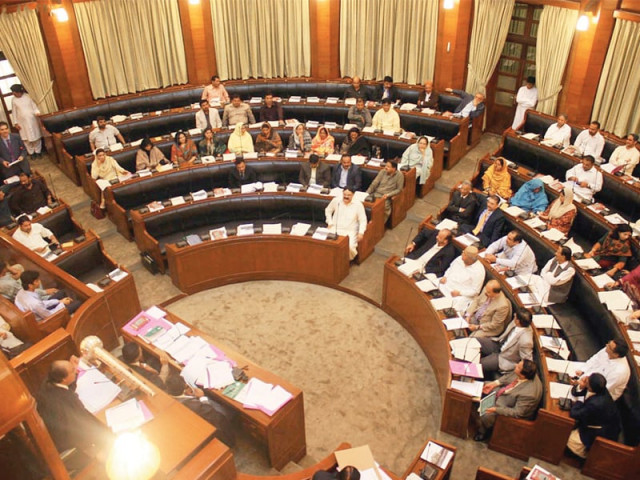Devolution dilemmas: Without ministers, 16 depts running under bureaucracy
Govt explains they are trying to cut down the number of ministries .

PPP’s parliamentary affairs minister Dr Sikandar Mandhro denied that any department was being run without a minister. PHOTO: ONLINE/FILE
A total of 16 departments of the Sindh government are running under the provincial bureaucracy as the government has yet to appoint ministers for them, The Express Tribune has learnt.
Out of a total 34 departments, only 16 departments have ministers and two have advisers forming the provincial cabinet. The rest of the departments are being run by bureaucrats for the last four months - undermining the democratic process through which representatives were elected into the House.
These ‘orphaned’ departments include home, health, law, irrigation, transport, coal energy, cooperation, culture tourism and antiquities, energy, higher technical education and research, labour, human rights, planning and development, and sports, services and general administration and coordination.

“Everyone, including the leaders of the ruling Pakistan Peoples Party (PPP), criticise bureaucrats every day as they are notorious for creating red-tape,” pointed out former chief secretary Syed Sardar Ahmed, the parliamentary leader of the Muttahida Qaumi Movement. “They [bureaucrats] should not be given a free hand to run the departments. It is high time the PPP-led government allot these portfolios to elected MPAs so that good governance can prevail in the province.”
Ahmed said that there will no be difference between the rule of a dictator and an elected government if the affairs of these departments are not handed over to elected representatives.
PPP’s parliamentary affairs minister Dr Sikandar Mandhro denied, however, that any department was being run without a minister. “The chief minister holds the charge of these portfolios and he is looking after the matters through secretaries and other employees.” Mandhro was of the view that there was no constitutional limit on the CM and he can handle provincial matters even with five members on his team.
The reason why the government has not inducted several ministers is because it is considering restructuring the provincial set-up by merging various departments, he clarified. “We used to have more than 40 departments and now they have been reduced to 34,” he pointed out. The 18th Amendment states that the cabinet should not exceed more than 11 per cent of the total members of the assembly. “This means we have to appoint only 18 ministers.”
The government is debating how to curtail the cabinet size and who should be inducted to these slots, he said, adding that the cabinet size in the last tenure exceeded 40 due to political compromises.
MQM’s Ahmed was, however, not convinced. The chief minister is the executive of the province and cannot give proper time to each and every department along with his other important engagements, he said. “This is not a one-man job,” said Ahmed. “The CM cannot handle all the departments even if he works 24 hours.” Ahmed suggested allotting two portfolios to each minister.
Pakistan Muslim League-Functional’s Imtiaz Shaikh pointed out that it is difficult to meet the CM, who holds the charge of these ministries, and the bureaucrats are even less accessible. He suggested the government distribute portfolios among elected representatives who not only can focus on departmental issues but will be easy to approach.
Meanwhile, former bureaucrat ANG Abbasi said that the department secretary is considered the in-charge in the absence of a minister. “The job of a minister is to make policy, not run the department,” he said. “That is executed by the secretariat.” In the absence of a minister, the secretary can obey the policy guidelines issued by the chief minister, he explained. In the present set-up in Sindh, there are 16 ministers, two advisers, six special assistants and two coordinators. This arrangement is, however, likely to be revamped in the coming days.
Published in The Express Tribune, October 3rd, 2013.



















COMMENTS
Comments are moderated and generally will be posted if they are on-topic and not abusive.
For more information, please see our Comments FAQ